#world cup qatar 2022 qualifiers
Explore tagged Tumblr posts
Text
I keep thinking about Livvy Dunn's mother saying that no one understands elite scoring and "competitions without Simone Biles" have empty seats.
But worlds has been sold out in recent memory except 2018 when it was held in Qatar.... every major US meet including Winter Cup and US Classic have been sold out for years ... yes there were empty seats at US Champs last year but that's because they sold all session passes and people bought those but didn't use all the tickets. I think there might have been some empty seats at 2022 European Championships but Olympiahalle has a seating capacity of 15,500.
So I'm left to the conclusion that Livvy Dunn's mother didn't understand how elite scoring worked and figured that most people were the same as her despite the fact that her daughter was actually doing the sport.
And she doesn't watch elite gymnastics.
Buy hey, if she meant there were empty seats at like... elite qualifiers? I'm sure there are. But I don't think any amount of ~*education*~ would make people go to one of those.
12 notes
·
View notes
Text

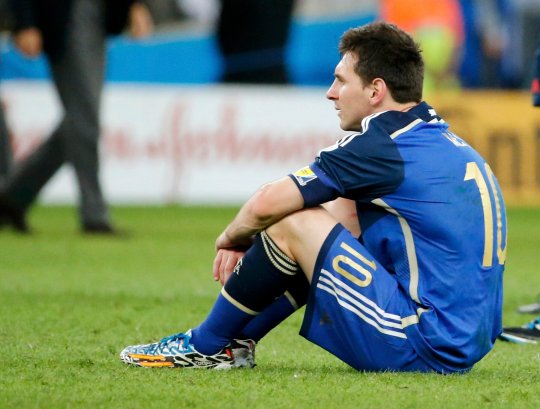
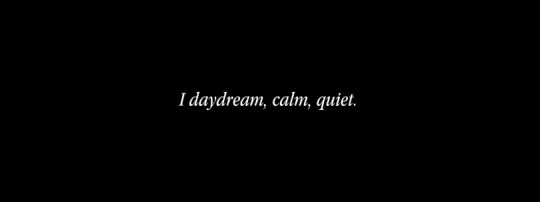
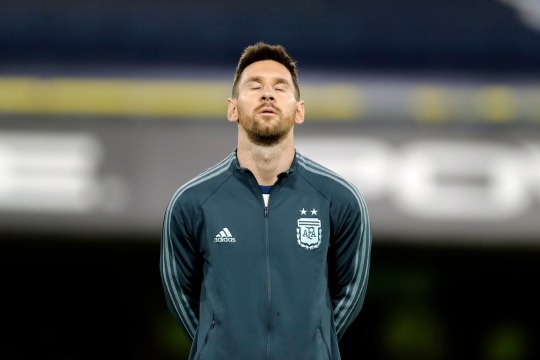


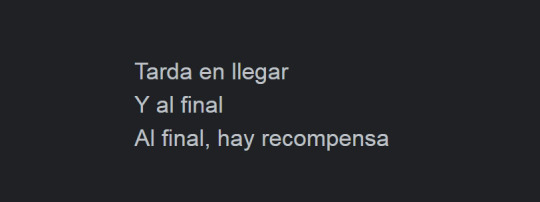
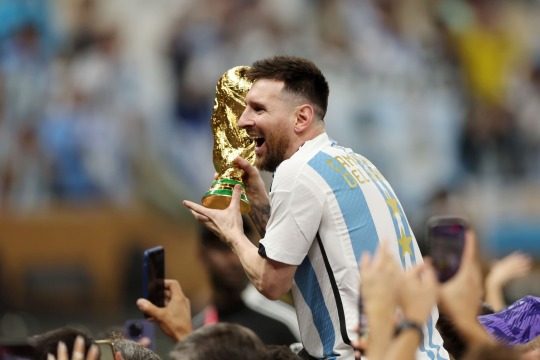




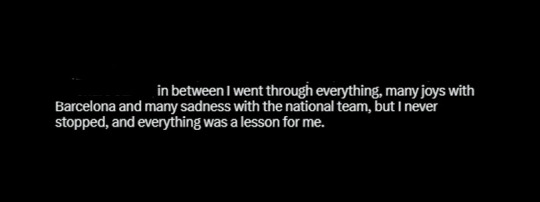
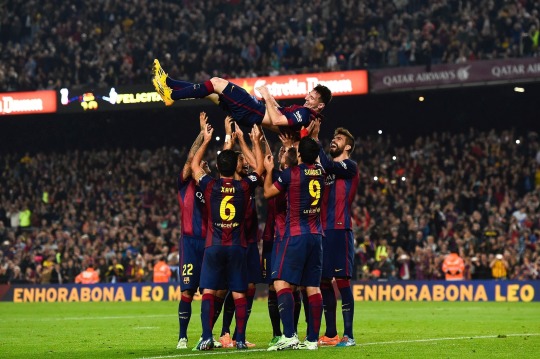
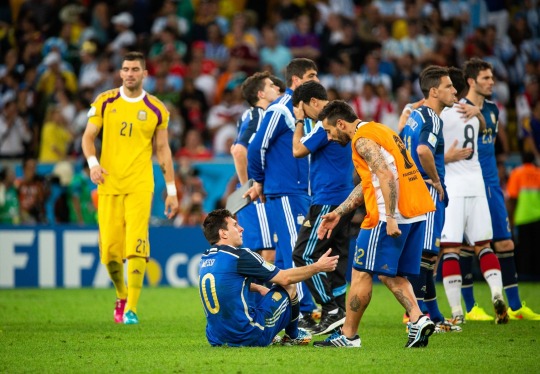


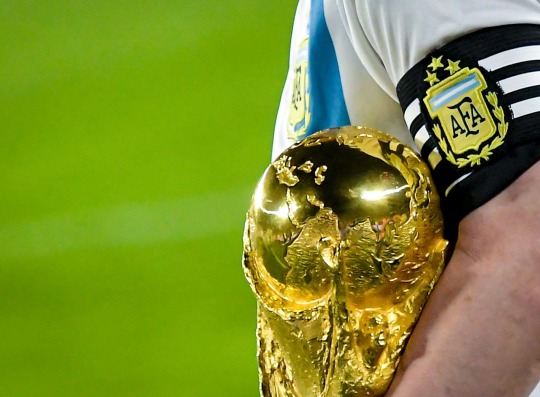
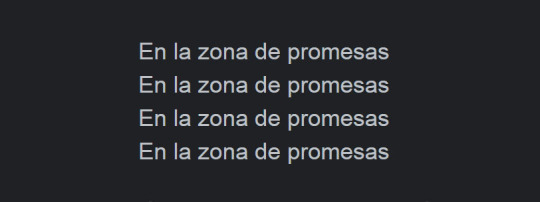

(1) Zona de promesas, song by Mercedes Sosa. (trans: "mom knows well, i've lost a battle) / (2) Copa América Final: Lionel Messi Tries to Slay His Ghosts - The New York Times / (3) Clarice Lispector, from the complete stories: 'one day less' / (4) Lionel Messi of Argentina closes his eyes during the national anthem prior to a match between Argentina and Paraguay as part of South American Qualifiers for Qatar 2022 at Estadio Alberto J. Armando on November 12, 2020 in Buenos Aires, Argentina. (Photo by Juan I. Roncoroni) / (5) Against Silence, Frank Bidart / (6) Lionel Messi of Argentina lifts the FIFA World Cup Qatar 2022 Winner's Trophy during the FIFA World Cup Qatar 2022 Final match between Argentina and France at Lusail Stadium on December 18, 2022 in Lusail City, Qatar. (Photo by Julian Finney) / (7) Zona de promesas, song by Mercedes Sosa. (trans: it takes time to arrive and in the end, in the end there is a reward) / (8) Lionel Messi of Argentina celebrates with the FIFA World Cup Qatar 2022 Winner's Trophy after the team's victory during the FIFA World Cup Qatar 2022 Final match between Argentina and France at Lusail Stadium on December 18, 2022 in Lusail City, Qatar. (Photo by Lars Baron) / (9) Lionel Messi speech after winning the 2023 Laureus World Sportsman of the Year. / (10) Lionel Messi of Argentina kisses the FIFA World Cup Qatar 2022 Winner's Trophy while holding the adidas Golden Boot award after the FIFA World Cup Qatar 2022 Final match between Argentina and France at Lusail Stadium on December 18, 2022 in Lusail City, Qatar. (Photo by Julian Finney) / (11) Tumblr textpost. / (12) Lionel Messi of Argentina celebrates with teammates after their fourth and winning penalty by Gonzalo Montiel in the penalty shootout during the FIFA World Cup Qatar 2022 Final match between Argentina and France at Lusail Stadium on December 18, 2022 in Lusail City, Qatar. (Photo by Maddie Meyer) / (13) Lionel Messi speech after winning the 2023 Laureus World Sportsman of the Year. / (14) Lionel Messi of FC Barcelona celebrates with his teammates after scoring his team's fourth goal during the La Liga match between FC Barcelona and Sevilla FC at Camp Nou on November 22, 2014 in Barcelona, Spain. Lionel Messi beat the number of goal in the Spanish La Liga of Telmo Zarra scoring his 252nd goal. (Photo by David Ramos) / (15) Lionel Messi is offered a hand by teammate Ezequiel Lavezzi of Argentina after the finial whistle and defeat at the World Cup Final match between Germany (1) and Argentina (0) at the Maracana Stadium on July 13, 2014 in Rio de Janeiro, Brazil (Photo by Simon Bruty) / (16) Lionel Messi speech after winning the 2023 Laureus World Sportsman of the Year. / (17) Lionel Messi greet fans during a victory parade of the Argentina men's national football team after winning the FIFA World Cup Qatar 2022 on December 20, 2022 in Buenos Aires, Argentina. (Photo by Gustavo Pagano) / (18) Lionel Messi of Argentina holds the FIFA World Cup trophy during World Champions' celebrations after an international friendly between Argentina and Panama at Estadio Mas Monumental Antonio Vespucio Liberti on March 23, 2023 in Buenos Aires, Argentina. (Photo by Marcelo Endelli) / (19) Zona de promesas, song by Mercedes Sosa. (trans: in the zone of promises) / (20) Lionel Messi of Argentina shoots the ball during the FIFA World Cup Qatar 2022 Group C match between Argentina and Mexico at Lusail Stadium on November 26, 2022 in Lusail City, Qatar. (Photo by Fu Tian).
#i don't think i'll ever forget about this#cried with the pic with everyone running after montiel's pen ngl#lionel messi#leo messi#messi#arg nt#argentina nt#seleccion argentina#selección argentina#web weaving#qatar 2022
89 notes
·
View notes
Text










only love can hurt like this the moment Korea Republic qualified for the Round of 16 @Qatar World Cup 2022 Dec 2rd 🇰🇷
#this never lessen#it was like the world at the time was rooting for them#can't wait for the next WC#which i think would be his very last WC and also his carrer#Sonny your youth was too hardcore#sonny#son heung min#son heung-min#forever
4 notes
·
View notes
Text
It’s been a rollercoaster 10 years since James Rodríguez wowed the world

It's been 10 years since James Rodríguez scored *that* goal. Yes, that one. You remember it well, surely.
The setting: Brazil's historic Maracanã stadium. In the 28th minute of their Round of 16 contest against Uruguay, Colombia's Abel Aguilar lobbed a header to James, who played it off his chest and volley-kicked it into the top of his opponents' net, near the corner, well beyond a diving Fernando Muslera. In a post-match summary of the goal, the poetic British commentator Peter Drury declared, "First touch, sumptuous. Second touch, magical. That's not a left foot. That is a wand." Uruguayan defender José María Giménez could do nothing more than stand with his hands on his hips, staring at the net in disbelief.
"My word, this boy's a star!" Drury proclaimed in the moment. James did not disappoint. He added another goal that game, taking his tally to five in the tournament after just four games. He'd add another in a quarterfinal loss to Brazil. Though Colombia would bow out at that point, James would go on to win the Golden Boot as the tournament's top scorer and, later, the Puskas Award for the year's most beautiful goal.
But it hasn't been a bed of roses for James in the ten years since Rio. Today, on his 33rd birthday, we take a look at the rise, fall, and revival of the Colombian midfielder.
The rising star
James had been building a strong career for himself in advance of the 2014 World Cup with productive seasons at Porto (32 goals in 107 appearances; 6 trophies) followed by a high-profile move to Monaco — a 5-year contract with a €45 million transfer fee. But in a post-World Cup interview, James said the magic words: that it would be his "life's dream" to play for Real Madrid. Ten days later, and with 4 years still left on his contract, James had signed with Carlo Ancelotti's band of superstars, a roster that included the likes of Cristiano Ronaldo, Toni Kroos, Kareem Benzema, and Sergio Ramos to name just a few. (Casillas, Pepe, Bale, Marcelo, Navas to name just a few more.)
Things started well at Madrid. Even amidst a team rich in talent, and despite being out for two months with injury, James contributed 17 goals in his first season. But later injuries and diminishing returns in successive seasons meant that James could no longer keep a regular place on the squad. New Madrid coach Zinedine Zidane also didn't seem to favor James' playing style, leading the Colombian to request a loan to Bayern Munich, where we would be reunited with Ancelotti.
Internationally, James was still making waves. At 25, he was named Colombia team captain for the 2016 Copa América, leading them to third place, losing only to eventual winners, Chile.

Fading away
Injuries plagued James for quite some time, keeping him from action for both club and country. After such a dazzling display in 2014, James sat on the bench at the 2018 World Cup and watched as his team went out to England in penalties in the Round of 16.
Despite scoring some key goals to help Bayern Munich win two league titles and a Pokal, James had netted only 15 goals in his 67 appearances with the club, and the owners opted not to pick up the option to purchase him. With no home in Munich or Madrid, he moved to Merseyside for a short stint with Everton (again, reuniting him with Ancelotti).
But failing to impress in England, and with no other clubs willing to take him on, James found himself playing for Qatar's Al Rayyan and didn't contribute much to their mediocre season. The Qatari team let him go just one game into his second season. He moved to Greece where he again lasted only one season after poor results with Olympiacos.
And James wouldn't get to return to Qatar for the 2022 World Cup as Colombia failed to qualify, finishing three points behind Ecuador for the last guaranteed spot. How did the World Cup star fade so fast for James?
Fast forward to summer 2023: James once again finds himself in South America. He now plays for São Paolo in Brazil, 13 years after he had left Argentina's Banfield, where he began built the reputation that catapulted him to European football. A name that had once dominated discussions among pundits — that had been proclaimed as "the next great thing" — had now faded into near oblivion. People weren't talking about James Rodríguez anymore.

Renaissance
After their failure to qualify for the 2022 World Cup, James expressed uncertainty as to whether he would ever again play for his country. That may have lit a fire under the team and perhaps even under him. Something started to happen...
Colombia started to pile up the wins, or at least had avoided losing. They had racked up victories against Mexico, Germany, and Brazil, among other countries. And before you knew it, they entered Copa América 2024 on a 23-game unbeaten run.
Enter James.
The attacking midfield has been a stalwart for Colombia all tournament and has been one of the keys to their success. In Colombia's five games so far, he has netted one goal and contributed six assists, surpassing Messi's tournament assist record. He's been man of the match for four of Colombia's five games of the tournament so far.
And when Colombia face off against Messi's Argentina in Sunday's final, James will need to play a pivotal role. Will his remarkable revival culminate in extending Colombia's historic unbeaten run and winning their first Copa América since 2001?
In addition to reinvigorating this Colombia team and resurrecting his career, James may also be accomplishing something even more outlandish — he may have some neutrals paying closer attention to him and Colombia than to Messi and Argentina. Colombia has arguably been the Copa's best team. Argentina has yet to come up against substantial competition and have had two victories over Canada.
Meanwhile, Colombia have had already had to battle both Brazil and Uruguay, defeating the latter while down a player for an entire half. The talented superstars of La Albiceleste, the world's #1 ranked team for the last 18 months now, can always dazzle and can outplay any team on their best day. But we've yet to see their best at this tournament, and it's feasible Colombia's passionate, fiery play could be a game-changer.
The bookies may have already made their prediction, but Sunday's eventual outcome is anything but clear. What is clear is that James Rodríguez will have a key role to play in whatever the result.
He's hoping it's a role for the better.
4 notes
·
View notes
Text
Women’s Soccer Globally: July 2, 2023
Around the world, women's soccer is in flux. There have been an incredible number of advancements in the last four years, but the increased media coverage has revealed a myriad of shortcomings as well. To be fair to the sport, I want to mention both here.
Norway and New Zealand were the only countries with equal pay between men and women in the 2019 World Cup; since then England, Brazil, Australia, and the USA have ratified similar policies. In Europe especially, women’s soccer is drawing sold-out, record breaking crowds. The women’s 2022 UEFA final drew 87,000 fans to Wembley Stadium in London, breaking the record for women’s AND men’s European championship game attendance. As much as western Europe remains a steady powerhouse of women’s soccer, other continents are starting to embrace women’s soccer as well. Morocco qualified for their first World Cup after unveiling a plan in 2020 to make the country a contender in the African Soccer Confederation, and proving that countries who commit resources to their women’s teams can and will see success.
However, equal pay in some countries definitely doesn’t mean equality is the priority in others. France, Canada, and Spain, all exceptionally well-funded and top-ranked teams, faced player strikes in early 2023 due to poor treatment of players by coaches and federations. In preparation for this world cup, Jamaica’s women’s national team has created a GoFundMe page just to cover expenses.
Other aspects of women’s soccer have struggled to meet minimum standards as well. After FIFA hosted the 2022 Men’s World Cup in Qatar, a country where women aren’t treated equally to men, there was a little backlash. When FIFA tried to make Saudi Arabia Tourism a sponsor of the 2023 World Cup, there was a LOT of backlash, and FIFA eventually had to back off. In a similar vein of racist and sexist policy, 2022 saw the French Football Federation ban hijabs for soccer players at all levels as part of a law intended to keep religion out of public spaces.
FIFA confirmed recently that players will not be allowed to wear rainbow armbands in support of LGBTQIA+ equality. The federation has approved 8 possible wristbands that support various causes, but none that explicitly support LGBTQIA people. In a sport that includes more lesbians than you can count and boasts the first transgender olympic gold-medal winner (Quinn, from team Canada), this is causing a massive controversy.
Despite the issues, FIFA maintains that they are making strides. In 2022 FIFA published the paper “Setting the Pace”, a report intended to benchmark the progress of women’s soccer globally. TV viewership, in-person attendance, and merchandise sales are up across the board. FIFA has also more than tripled the prize money available for the 2023 World Cup, although the men’s tournament was awarded four times as much. The president of FIFA has indicated that he would like to see an equal payout for the women as soon as 2027, but right now that is just an empty promise.
In the opener of this World Cup, ticket sales proved that FIFA grossly underestimated the popularity of tickets, and games sold out in the first 24 hours of ticket sales. In response, FIFA moved the opening Australian game to a bigger stadium and has released additional tickets, which have now sold out for the second time. Again and again, fans and athletes alike prove that all over the world, people like women’s soccer.
2 notes
·
View notes
Text
World cup 2022
Football is a world wide known sport. We can say as if the most famous game internationally, countries like France, Spain, Poland, Israel, Italy, Mongolia etc. have their National sport as Football.
The Federation International De Football Association(FIFA)is the governing body of this that controls and associates football competitions around the world. It was founded in 1904 to oversee international competition among the national associations of Belgium, Denmark, France, Germany, the Netherlands, Spain, Sweden and Switzerland. Fifa world cup is one of the most famous competition of this sport around the world. It is held after every 4 years. It is a knockout cum league kind of tournament in which teams have to go through league matches at the start of the tournament and then knockout matches if they qualify from the league tournament. Groups are made of 4 or more teams each and 2 teams qualify from every tournament.
The latest fifa world cup was held in the year 2022 in Qatar which was won by Argentina led by the captain Lionel Messi. It was Argentina’s third title and their first since 1986. French player Kylian Mbappe became the first player to score a hat-trick in a world cup final since Geoff Hurst in 1966 final and won the golden boot as he scored the most goals(eight) during the tournament. Argentina’s captain Lionel Messi was voted the best player of the tournament, winning the golden ball. Teammates Emiliano Martinez and Enzo Fernandez won the golden glove, awarded to the tournament’s best goalkeeper, and the young player award, awarded to the tournament’s best young player, respectively. Every world cup tournament is always filled with enthusiasm,courage,sportsmanship,friendship,etc. But this world cup was filled with something more than that, it was one of the most unexpected and unpredicted world cup ever played by the players. There was laughter but also tears, there was happiness but also sadness, there was friendship but also rivalry. The world filled the players as well as the audience with great filling of suspense and joy .
Personal reveiew:
Personally I was not happy after watching this world cup as I supported Portugal in which played by favourite player Cristiano Ronaldo. Seeing him in tears after loosing the quarter final match from Morocco made me really sad. I had really high hopes for him to win this world cup. But this man never gave up and gave his best until the very end, I’m really happy to be his fan although we can’t get what we always desire for.
2 notes
·
View notes
Text
Lionel Messi at the 2022 World Cup
The first ever winter World Cup appeared perfectly timed for Lionel Messi. The previous season, his first in the colours of Paris Saint-Germain, had been the toughest of his career to date. The flawless finishing we had witnessed for well over a dozen years momentarily deserted him and was replaced with efforts suddenly being denied by posts, crossbars and goalkeepers, more often than they were finding the net. For the first time since his teenage years, Messi failed to reach double figures in the league, scoring just six goals in 26 appearances, and 11 in all competitions. Those who saw this and declared Messi’s glory years over would quickly be proven wrong however as just a few months into his second campaign with PSG and his difficulties in the previous season were already nothing but a rapidly fading memory.
By the time club football took a winter break for the mid-season World Cup, Messi had already outperformed last season’s goal haul, with 7 in the league and 12 in all competitions. On top of this he also added 14 assists in the 19 games he featured. The numbers and performances showed us Messi was coming into the World Cup bang on form, and given his age of 35, playing this tournament mid-season rather than at the end of another long 50+ game season, was likely to be more of a help than a hindrance.
The Argentina side he would be captaining at the finals were unbeaten since they suffered a loss to Brazil at the 2019 Copa America, their 5th tournament in 6 years where they had been unable to end a trophy drought which stretched back to 1993. Messi may have dragged his nation to three major finals in as many years but falling short in all of them led him to announce a short-lived retirement. He was back playing for the Albiceleste shortly after but the 2018 World Cup in Russia looked like something akin to torture for him. Rarely if ever did he seem to exhibit the same joy and freedom in Argentina’s colours as when playing for Barcelona.
That was until the 2021 Copa America in Brazil, when at his 10th major tournament, Argentina finally assembled the right supporting cast around Messi, and with it Leo dazzled scoring 4 and assisting 5 as he led Argentina to the final. In the final he wasn’t at his best, a result of an extremely physical semi-final against Colombia, but for this new Argentina they could find a way to win without relying solely on their talismanic captain. Di Maria scored the goal which won them the cup at the Maracanã against hosts Brazil and suddenly Argentina who had been so poor at the 2018 World Cup were now one of the top favourites for the next World Cup which would take place the following year in Qatar.
Argentina only strengthened their credentials with a run of 36 games unbeaten going into the World Cup. This run took in their Copa America triumph and aswell included a 3-0 win over European Champions Italy and on the very eve of the tournament a 5-0 win over UAE. In that game Messi notched his 18th goal for Argentina in his last 22 appearances, it was with real belief he and his teammates would begin Group C. Assigned to a favourable looking group alongside Saudi Arabia, Mexico and Poland, it would be the Saudis first up for Argentina.
v.s Saudi Arabia 1:2- Group C
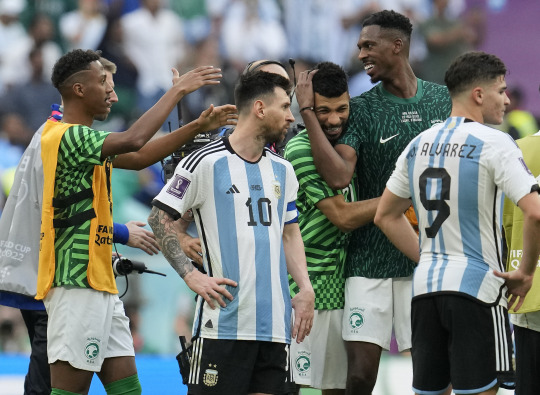
Saudi Arabia are regular World Cup qualifiers, Brazil in 2014 being the only finals they haven’t reached since first qualifying in 1994. They are not however regular World Cup winners, having won just one game since they reached the knockout stages for the one and only time at their first World Cup. They appear to be the perfect opponent for Argentina to lay down a statement of intent with an emphatic victory.
It takes just 94 seconds for Messi to have his first shot on target, forcing Al Owais into an early save. A few minutes later and holding in the box as Saudi Arabia attempted to defend a corner drew the attention of VAR, who alerted the referee to have a look at a possible penalty. The referee decided it went beyond the acceptable level of grappling and pointed to the spot, giving Messi and Argentina the chance to make the perfect start. The chance was taken as Argentina’s number 10 calmly rolled the ball into the net for 1-0.
Messi appeared to have his and Argentina’s second in the 22nd minute when a long ball over the top left him baring down on goal and he calmly slotted home. However the linesman’s flag was then immediately raised. Five minutes later there was an even tighter call after Lautaro Martinez had gone clear and lifted the ball over the onrushing Al Owais. This time it was VAR who intervened to rule it out, judging Lautaro’s shoulder to be offside. Remarkably 7 minutes later Argentina had the ball in the net for a fourth time, and for the third time it was disallowed for offside. This was the clearest offside of the lot, though Lautaro’s composed step-over and finish after Messi had put him through displayed Argentina’s supreme confidence and the control in which they exerted over the match.
Despite Argentina’s dominance in the first half, they had just one goal to show for it. And the frailty of that lead was exposed just three minutes into the second half when Alshehri expertly shot through the legs of a sliding Christian Romero and from a tight angle the ball bobbled into the bottom corner past Emiliano Martinez. The goal had come from a simple ball straight down the middle after Messi had been dispossessed in midfield. Just 5 minutes later, things went from bad to worse for Argentina as Nicolas Otamendi’s failure to get distance on a clearance eventually led to the ball finding Aldawsari who made room for the shot by cutting inside and then let fly from just inside the area. Martinez got a hand to the ball, but the power beat him and suddenly Argentina were behind against Saudi Arabia.
Argentina almost respond immediately when Messi is found in the box, but just as he is about to shoot a potentially goal-saving tackle flies in on him from Abdulhamid, who celebrates this tackle like a goal, and he isn’t the last Saudi player to do so. The Albiceleste come closer still when Lisandro Martinez’s close-range shot deflects off the knee of Tagliafico from even closer, but Al Owais’ reflexes are up to the task.
Following these chances, you could see the panic start to set in for Argentina as the reality of what defeat here could mean began to dawn on them. They began to fall back into their old habits of relying on Messi to rescue them. Since the last World Cup, Argentina had ended their long wait for silverware and were on the verge of equalling Italy’s world-record of 37 matches unbeaten. However as the clock ran down on them here, they could have been mistaken for the Argentina of 4 years ago who had toiled against Iceland and Nigeria.
For a period in the second half Saudi Arabia correctly identified that if they could stop Messi, they could stop Argentina as the nerves and pressure began to get to his teammates. With 10 minutes of normal time left, Messi won a free kick in a promising position for a strike at goal, but his shot sailed harmlessly over the bar. He was closer a few minutes later when he was found in the box by Di Maria, but the floated ball didn’t allow Messi to generate enough power on his header to seriously trouble the keeper.
As they neared closer to a historic victory, the Saudi’s gave full commitment to every sprint and tackle, it was going to take something special to snatch victory from them. They time-wasted, they took yellow cards and did everything they could to see the game out. Due to the timewasting, there was in the end an extra 13 minutes of additional time played for them to defend for their lives. But it seemed not to matter if the board had showed 30 minutes, Saudi Arabia were not going to be denied 3 points on this day.
Having turned the game completely on its head in 5 mad minutes, they refused to squander their new-found lead through any fault of their own. There would be no shortage of desire, nor intense concentration in order to maintain their advantage and in the end it was enough to ensure one of the World Cups big upsets. And we were left wondering whether Argentina were just cursed in World Cups, having reached the Semi-Finals just once since 1990. But after this result the immediate worry was now just to ensure they got out of the groups.
v.s. Mexico 2:0- Group C
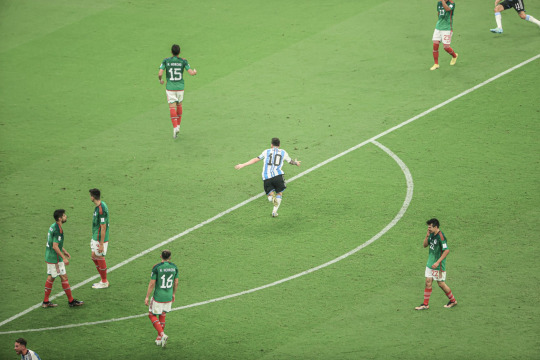
In the lead-up to what was now a do-or-die game against Mexico, Messi spoke to the media: “In five minutes of mistakes that we made, we went 2-1 down and then it was really tough, we lost organisation and started punting the ball. It's up to us to fix what we did wrong and get back to the basics of who we are. We're OK, obviously hurt by the result, very bitter. But people must trust that this team will not let them down and we are going to go for it in the next two games.” It was strong words from the skipper and Argentina were also aided by results going their way in the other group games. First Mexico and Poland played out a 0-0 draw with Robert Lewandowski missing a penalty, then Poland beat Saudi Arabia 2-0. These results helped ensure Argentina’s destiny remained in their own hands.
However as the game began it was clear these results had done little to settle Argentina’s nerves, nor had the 5 changes Lionel Scaloni made to the starting 11, including 3 in the defence. Though you regularly see both Argentina and Mexico in the knockout stages of the World Cup, the first-half here was more befitting of a League 2 match. The match was scrappy and extremely low on quality, littered with fouls which forced the game into a stop, start nature. The first sight of goal for either team didn’t arrive until the 40th minute when Lautaro’s header cleared the crossbar after being found by Angel Di Maria. Mexico’s one moment came in the 45th minute when a Vega free-kick forced Martinez into action.
The most concerning sight in the first half for Messi and Argentina fans had been where the number 10 constantly received the ball and the movement, rather the lack of it around him. Argentina’s forward movement was very static, the player in possession left short on options so even Messi with having difficulty in progressing his team up the pitch when receiving it around the half-way line, where nearly all of his touches were. The first half had been in many ways, even more troubling than the second half against Saudi.
At half-time in the ITV studio, Gary Neville said: “Players aren’t fearful of Lionel Messi anymore. They are taking the ball off him easily.” Joe Cole bizarrely put Messi’s struggles in the first-half down to the fact that “It's tough to get out of bed and get your roadwork done at 5am when you're sleeping in silk pyjamas." Neville and fellow pundit Roy Keane then found time to criticise Di Maria, with Neville saying “He’s got no heart.” to which Keane responded: “He’d break your heart, I’m not sure he’s got one.” Based on these words, Argentina may aswell not have bothered coming out for the second half.
They did, but nothing appeared to have changed from the first. 5 minutes into the half and Messi won a free-kick in a dangerous position. Due to the lack of clear-cut chances this presented as good a chance as any for him to find the target. But his effort never threatened to harm the Mexico goal, flying high over the bar. It just about summed the game up so far for him and Argentina.
Messi disappeared from the game once more, Argentina now had less than half an hour to find a goal that was looking increasingly unlikely. They were on the verge of having just one point from their opening two games, when Messi picked the ball up in the same kind of unthreatening position he had all game. He played a simple pass forward then continued his move toward the penalty area. Mexico’s midfield all then turned their attention to the ball and ignored Messi’s positioning. Di Maria however noticed exactly where he was and found Messi in a pocket of space. With one touch he set it out his feet and with the second he arrowed the ball into the bottom corner.
Afrer scoring the vital opener, Messi shouted to the players: "Come on, look at the scoreboard. Now that's in front of you, look at it. 88,000 spectators are looking at you and 45 million Argentines are behind us watching. We won't let them down today, guys. Defend it like savage hyenas. Focus and never miss a ball." De Paul who had been struggling in the game conceding the ball cheaply was told in no uncertain terms by Messi that if he lost another ball, he didn’t want to see his face after the match. The midfielder responded to this by playing a lot better for the remainder.
Mexico never looked like possessing the quality to equalise but the 3 points weren’t secure until the 87th minute when Enzo Fernandez doubled Argentina’s lead. With a step-over he bought room for the shot, and he didn’t waste it by bending it in past Ochoa. Messi played the pass for the goal to become the first man to register an assist at 5 World Cups. With the full-time whistle Argentina could breathe a huge sigh of relief. They were off the mark at the 2022 World Cup, thanks in large part to their captain whose wonderful goal came at a time when he and Argentina were clinging on to their dreams of glory.
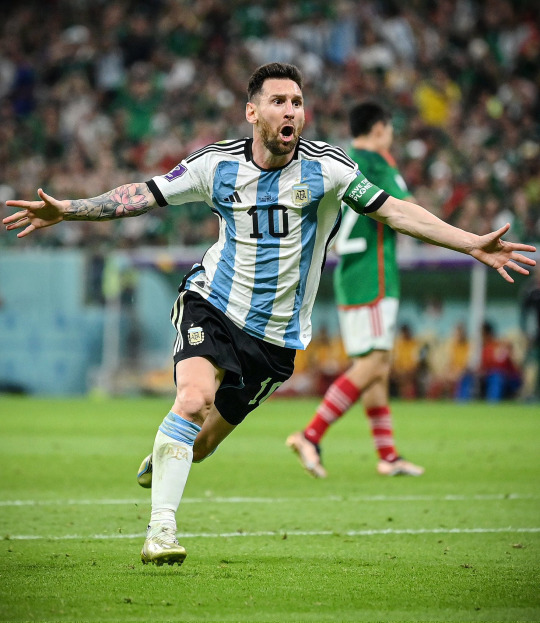
“Well they haven’t got much, but they have got him!”- Sam Matterface as Lionel Messi opens the scoring against Mexico
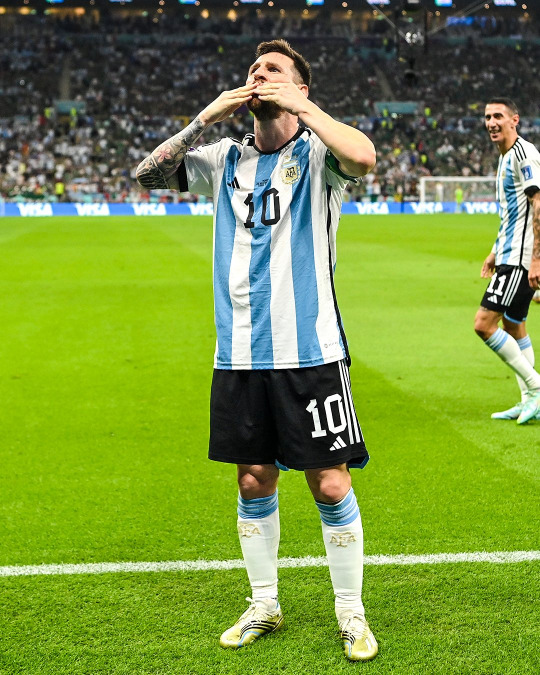
“One more Messi moment and Argentina are alive!”- Peter Drury
v.s Poland 2:0- Group C
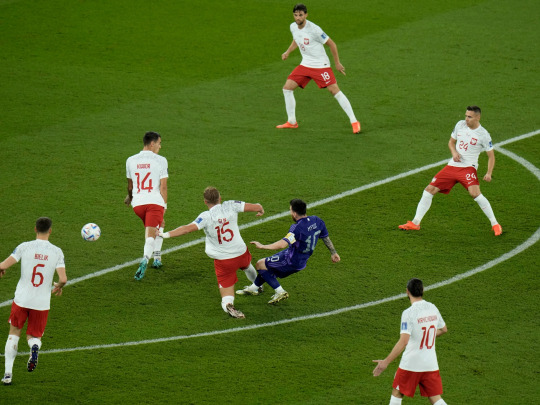
Going into the final matchday Argentina knew that a win over Poland would near certainly be enough to see them secure top spot in the group. This was due to them having a positive Goal Difference, and Saudi Arabia having a negative one. Poland though would be mathematically certain of topping the group if they beat Argentina. Finishing 1st was vitally important as 2nd place in the group would meet France. Having faced France at the same stage 4 years ago, Argentina would be keen to avoid a repeat, with memories of an 18-year old Kylian Mbappe sprinting through the middle of their defence still raw enough to know if you get the chance to avoid him, you should take it.
However from the offset Poland had only the draw they needed for qualification in mind. They lacked the belief to try and obtain the win to ensure they topped the group and instead sat back, inviting Argentina (wearing their purple away jersey for the one and only time in the tournament) to dominate possession which they duly did. Unsurprisingly it was Messi who had the best chances of the first half. Running into the box he was faced with a tight angle, but the power generated in the shot forced Szczesny into a smart save down low at his near-post.
A golden opportunity would arrive in the 36th minute when a cross from Julian Alvarez was missed by the Polish keeper and reached by Messi though his header ended high over the bar. However, Szczesny caught Messi in the face when attempting to reach the ball, and as it was Messi who made contact with the ball, the Polish number 1 was judged to have committed a foul after the referee watched the incident back on VAR. Though Szczesny was to redeem himself with an outstanding penalty save, guessing the right way and getting a strong hand to Messi’s kick. The penalty was struck with power, but Szczesny’s hand remained firm and palmed it to safety.
It seemed like nothing could go straightforward for Messi and Argentina at the World Cup. Given the chance to turn all their pressure and domination into a goal from the spot, they’d been unable to convert it. Was it going to be another one of those awful days for them? Such fears were quickly dismissed as they broke the deadlock in the very first minute of the second half. Molina’s cross into the box was fired into the feet of Alexis Mac Allister who opted against needing a touch and instead just stroked it into the bottom corner, hitting the inside of the post on the way in.
Despite now trailing, Poland were unwilling to alter their game plan and it was Argentina doing all the searching for the game’s second goal. Messi took the ball from well inside his own half and dribbled it all the way into the Poland box before scuffing the shot well wide. In the 67th minute the Albiceleste made sure of top spot, after Enzo Fernandez had threaded the ball into Julian Alvarez who took two exquisite touches to make room for a shot that flew into the back of the Polish net.
With Mexico leading Saudi Arabia 2-0, Poland were currently only progressing through by virtue of having fewer yellow cards than the Mexicans. Rather than pushing for a goal themselves, they seemed to be relying on Argentina not getting another. This plan appeared flawed however, as Messi looked like he was starting to enjoy the World Cup stage, spraying passes with ease and dribbling past bodies at will. The pick of the passes came in the 74th minute when from the half-way line he instantly spotted the run of Alvarez, and weighted it perfectly into his path. Mercifully for Poland, he could only find the side-netting. The match finished as one of the most one-sided of the tournament with Argentina managing 12 shots on target to Poland’s 0.
It would however, be Poland joining Argentina in the last 16, a 95th minute goal for Saudi Arabia confirming it beyond doubt. After the game Rio Ferdinand said: “he wasn’t even at his best today but the best 3 or 4 dribbles in the game was Messi, the best 3 or 4 passes in the game was Messi and the best player on the pitch was Messi.” Poland were poor opposition and therefore did not provide much of a test, but Argentina were growing in confidence. For the first time in the tournament they started the midfield three of Enzo Fernandez, De Paul and Mac Allister. Julian Alvarez also made his first start after Lautaro had struggled against Mexico, and he had not wasted his chance. This was a significant game for Argentina as from this point on those four players would start every game together.
They had lost the first game but still topped the group just like Spain did before going onto win it in 2010. There was also the curious statistic that Mario Kempes missed a penalty in Argentina’s third World Cup game in 1978 as did Maradona in game three of 1986. On those occasions, Argentina went on to lift the World Cup, with Messi missing on matchday three this time, would history repeat?
v.s Australia 2:1- Round of 16
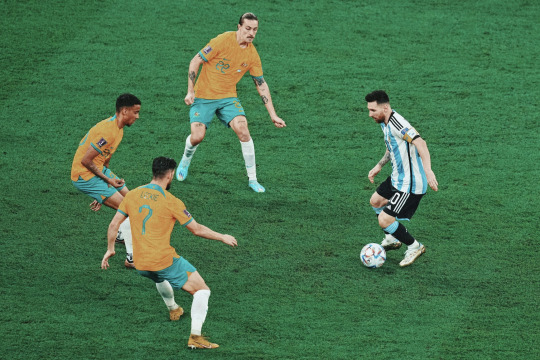
Australia would be Argentina’s Round of 16 opponents, and also the opposition for Lionel Messi’s 1,000th official senior game. It would also be Messi’s 100th match as captain of Argentina, so the stage was set for something special and expectation was high. Australia like Argentina had lost their opening game and then won their next two. They had recovered impressively from a 4-1 loss to France by notching back-to-back 1-0 wins over Tunisia and Denmark.
For 34 minutes, not a lot happened. Argentina controlled the ball but they struggled to find space in dangerous areas against a well-drilled Aussie side full of tall, strong players keen to impose their impressive physicality on the contest. It would be who else but the smallest player on the pitch to spring the game into life. Messi whipped in a free-kick from the right-hand side which was headed out by Souttar only as far as Papu Gomez who recycled the ball back to Messi for him to lay into Mac Allister before moving inside, Mac Allister’s pass found Otamendi who played it back to Messi now inside the penalty area. Messi took a touch then stroked it firmly into the net, through the legs of the stretching Australian defenders and past the outstretched glove of Matt Ryan. 1,000 games, 100 as Argentina captain and a very 1st goal in the knockout rounds of a World Cup.
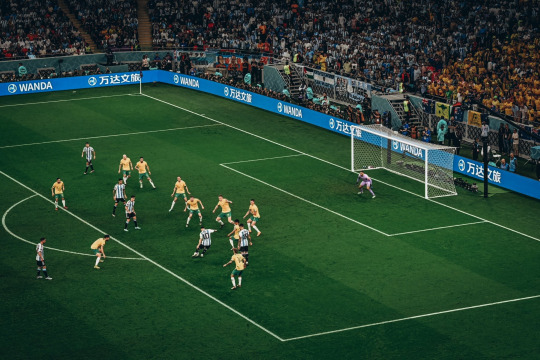
“He’s only gone and done it again! A Thousand games and still he excels! They’ll never be another like him! Enjoy him while he’s here.”- Peter Drury
Argentina doubled their advantage 12 minutes into the second half as the result of an excellent press from Rodrigo De Paul, who sprinted at the Australian defence forcing them to play it back to keeper Matt Ryan. De Paul didn’t stop there and chased all the way back to the keeper who tried to take the ball past him with his second touch and tempt him into a foul. This proved a costly error as De Paul didn’t take the bait and instead let him past, as Alvarez was also on the hunt for the ball and picked the keepers pocket, before simply rolling it into the empty net.
For the rest of the second half it was absolutely vintage Messi. Receiving the ball inside his own half, he turned away from one Australian midfielder, then dribbled through a gap of another three, leaving them trailing in his wake and looking statuesque, with seemingly none of them willing to be the one to draw the short straw and attempt to tackle him. Before they could make up their mind what to do, the 35-year old had left them in the dust. Advancing onto the defence, the ball ricocheted to Alvarez who played it back to Messi who beat one challenge in the penalty area before finally being stopped by a second defender who gratefully conceded the corner.
There is a sting in the tail however when an only half-cleared cross lands at the feet of substitute Craig Goodwin, whose powerful but wayward first-time shot changes direction in the air after cannoning off Enzo Fernandez and leaves Emiliano Martinez flat-footed and rooted to the spot as the ball diverts into the back of his net. A few minutes later and Australia almost completed the comeback, their full-back Behich embarked on an incredible driving run which saw him beat 4 Argentine shirts before finally being denied by Lisandro Martinez just as he prepared to take his short, it was a vital intervention.
Though right back in the game, Australia could do nothing to disrupt Lionel Messi’s rhythm. He wasn’t feeling the pressure, he was playing the match as though a testimonial. He controlled the tempo and pace of Argentina’s play, if he wanted to slow things down the Australians could not find a way to rush him, if he wanted to speed things up he would subtly switch the gears and drive Argentina forward. Which ever one he opted for, the ball was always safe in his possession, and thankfully for Argentina he was seeing plenty of it. There was a chance to make the game completely safe in the 89th minute when a run from Messi enabled him to occupy all 4 Australian defenders and drag them away from Lautaro Martinez who was left in acres of room, at the perfect time Messi rolled it across to him but now lacking confidence he got under the ball and lifted a horrible shot well away from goal.
Moments later Messi found Martinez for a second time, this time the striker was able to hit the target but Ryan was equal to it. The number 10 is doing everything to put the game to bed, beating another 2 men he finds himself in the box, faced with 3 opposition players he is still able to get a good shot away, he looks for the top corner and the keeper is well beaten, but it’s a fraction too high. As the 7 minutes of injury time run down, it’s Argentina and Messi who are pushing for the game’s 4th goal. He finds Martinez for his third shot on goal, but his deflected shot is saved by Ryan and Messi is not ready when the save rebounds at his feet, dragging his shot wide.
Then suddenly with 30 seconds left on the clock, Goodwin’s cross finds Kuol who is able to spin his marker, luckily for Argentina Emiliano Martinez was ready and immediately sprinted off his goalline, narrowing the angle and the shot was blocked by his left arm which took the sting from the shot and allowed him to collect the ball and collapse onto it in relief. He was joined on the floor by a couple of his teammates, no doubt thanking him for getting them out of trouble.
It had been an interesting night for all 3 of Argentina’s Martinez’s, Emiliano and Lisandro had made fantastic blocks to deny equalisers, whereas it had been a bad night for Lautaro, wasting opportunities that would have made the win certain. But overall, the game was the story of Messi. In his 1,000th game, he had produced his greatest World Cup performance to date, a performance described by Rio Ferdinand as “the best individual performance we’ve seen at this World Cup so far, by a mile.”

v.s Netherlands 2:2 (4-3 on penalties)- Quarter-Finals

Argentina vs The Netherlands was to be the mouth-watering Quarter-Final clash. To the surprise of everyone, the winner would not go on to face tournament favourites Brazil as earlier that day they had been dumped out on penalties by plucky Croatia. Given the history of this fixture which had been the final of the 1978 edition, the semi-final when Messi reached his first World Cup final in 2014 and produced one of the most memorable Quarter-Finals ever the last time they met at this stage in 1998, it was a game that scarcely needed spicing up. But it seemingly got it anyway, with comments made by Dutch manager Louis Van Gaal that “you would see his plan to stop Lionel Messi on Friday night” taken to be disrespectful and arrogant by the Argentine side.
Scaloni decided to match up with Netherlands’ 3-5-2 by playing the same formation, dropping a forward out for defender Lisandro Martinez. This decision was made easier by an injury to Angel Di Maria who was only fit enough for the bench.
After a tight opening which was just about shaded by Argentina, Messi was the orchestrator of the game’s first goal in the 35th minute, the exact same minute he’d scored the games opener in the previous match against Australia. This time he was to be the provider however, with a body swerve and a drop of the shoulder Messi found the angle he wanted to thread a through ball between the legs of Nathan Ake and into the path of Molina, the weight of the pass was too perfect for Daley Blind to intercept, he was taken out of the game and Molina was left with just the keeper to beat which he duly did.
With a couple of minutes left in the half we were given a sign of what was to come as Lahoz’s fussy style of refereeing began to lose control of the match. The Spanish ref flashed 4 yellow cards in moments to Argentina coach Walter Sammuel, aswell as Dutch substitute Wout Weghorst who was yet to enter the game. More significant was the yellow card shown to Acuna, which would rule him out of the semi-final. In the second half Messi went close with a free-kick which was just too high and found only the side-netting, before an even better dead-ball opportunity presented itself when Dumfries brought down Acuna in the box giving the referee little alternative but to point to the spot.
Faced with the 6 foot 6 inch goalkeeper Noppert, Messi stroked the penalty home with Noppert choosing to stay down the middle. With his celebration, Messi paid tribute to Juan Roman Riquelme’s trademark goal celebration, Riquelme whom it was noted famously clashed with Van Gaal when the two were together at Barcelona. Also noted was the fact Messi did the celebration with his eyes firmly set on the Dutch bench.

The Netherlands had barely threatened all game, so the two-goal cushion was thought to have killed the contest and put Argentina safely through to the final 4. However with time running out and nothing left to lose, Van Gaal decided to throw the kitchen sink at it by taking off his more technical forwards and bringing on less gifted players who would be more of a threat in the air where they could use their height advantage. This strategy quickly paid dividends as the Dutch pulled one back with 7 minutes of normal time remaining, Weghorst directing his header past Martinez.
With a minute of normal time left, the bad tempered game which had been simmering along finally reached its boiling point when Parades clattered into Nathan Ake and then blasted the ball into the Dutch bench. Luckily it didn’t hit anyone, if it did he may not have escaped with just a yellow card. The melee that followed saw all of the Dutch substitutes storm onto the pitch in fury, though it was Van Dijk who got to Paredes first and bumped him to the ground, for which he avoided punishment.
The referee had frustrated both teams with his fussiness, which saw him constantly blowing his whistle to signal free-kicks for every minor and sometimes non-existent infringement. This led to 11 minutes of stoppage time being awarded and it was in the final of those added minutes when the Dutch equalised. From a free-kick, Koopmeiners, instead of shooting, worked a routine straight off the training ground by instead passing it past the wall and through to Weghorst who managed to hold off his marker and fire it past Martinez. It was the substitutes second of the game and the assist came from a fellow substitute, it had proved a tactical masterclass from Van Gaal.
The first half of extra-time passed without notable incident, both teams looking to catch their breath. Netherlands seemed relieved to just still be in the competition, Argentina concentrated on re-composing themselves and looking to regain control of a game that had momentarily got away from them.
All the big second half chances went Argentina’s way, they continued to probe for a winner, coming closest in added time at the end of extra-time when Fernandez let fly from outside the box and beat the goalkeeper only to be denied by the post. Like their encounter 8 years previously, the two sides would be separated by a penalty shoot-out when the referee finally called time on a game which had included 48 fouls, with 30 from the Netherlands.
As in their 2014 World Cup shootout, the Dutch were first up. Again it would be a centre-back, then it was Ron Vlaar, now Van Dijk. Different names but the outcome remained the same, the player missed. Although more accurately, Martinez saved by diving correctly to his right and getting both hands to the ball. Next Messi faced Noppert from the spot for a second time, and the result was the same. He waited for the keeper to commit to his dive then just rolled it the other side.
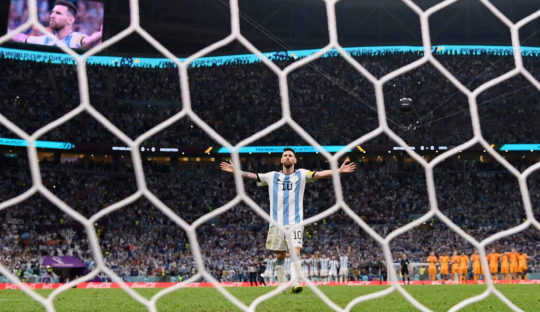
Berghuis then stepped up for the Netherlands, and he was also denied by Martinez who again guessed right, this time going left and making another outstanding penalty save. Noppert then guessed right for Parades’ kick but still couldn’t get anywhere near it due to perfect placement. Martinez stays in the middle for Netherlands third penalty and Koopmeiners blasts it into the far corner. Next up goes Montiel and he makes it 3 from 3 for Argentina sending the keeper the wrong way.
Weghorst keeps the Dutch alive in the shootout but if Fernandez scores its all over. As he makes his way towards the spot, Dumfries is booked for gamesmanship as he goes with Fernandez, attempting to break his concentration. It seems to work as the midfielder fired wide, keeping alive slim Dutch hopes. De Jong then levels the shootout but Argentina have one kick remaining. It’s Lautaro Martinez who steps up, who had been enduring a difficult World Cup. Noppert hands him the ball and begins talking to him, begins the mind games. Martinez appears completely unruffled and he demonstrates this by sending the keeper the wrong way and his team through to the semi-finals.
The drama still wasn’t over as quickly Argentina’s joyful celebrations were replaced with players and coaches from opposing sides coming face-to-face once more in angry confrontations. Messi became embroiled in a heating conversation with both Louis Van Gaal and assistant coach Edgar Davids. Messi’s hand gesture making plain what his issue with them was, the talking the Dutch camp had done in the build-up to the match.
As Messi then gave a post-match interview to Argentine broadcasters he was distracted by Weghorst who was stood close by looking at him and apparently waiting for him. With the microphone still in front of his face, Messi snapped at Weghorst: “Qué mirás, bobo? Qué mirás, bobo? Andá para allá.” which translates roughly to “What are you looking at you fool? Go away.” When giving an interview to FIFA, Messi again didn’t hold back saying “It’s very frustrating. We were scared before the game because we knew what this was. I think FIFA must think about it, they cannot put a referee like that for these important games, for such a pivotal game — a referee who isn’t up to the task.” The Argentine public loved seeing this side of Messi, usually so shy and reserved. He seemed to be channelling his inner Diego Maradona as he angrily went at the Dutch coaches, Weghorst and the referee. This side of him showed just how much this World Cup meant to him and his desperation to win.
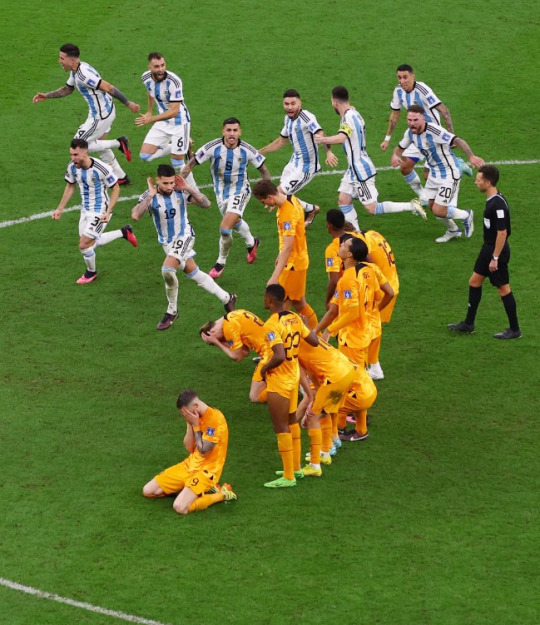
v.s Croatia 3:0- Semi-Finals

4 years prior when Argentina met Croatia in the World Cup group stages, during the national anthem, Messi had anxiously rubbed his forehead, looking like the loneliest man in the world, carrying a load too heavy for his weary shoulders, they went on to lose the game 3-0. Now as he prepared to face Croatia in the World Cup semi-finals, as the national anthem played, he stood with his chest puffed out singing from the top of his lungs. Just as much as the match to follow, this emphasised the transformation that had taken place within Messi and in the national side he represents.
For the Semi-Final, Scaloni made another tactical adjustment. Seeing how strong Croatia were in possession and how their centre midfielders could dictate a game, Scaloni started four centre-midfielders against the Croatian three of Kovacic, Brozovic and Modric. Particular importance would be put on limiting the latter’s time on the ball, such was his role in the Croatian side. Despite this Croatia were still able to shade the opening half an hour, showcasing their impressive ability to keep the ball. The game changed in the 31st minute when a scooped through ball from Fernandez put Alvarez in on goal, his contact on the ball was not enough to find the net however goalkeeper Livakovic had taken him out and the referee pointed to the spot.
Croatia had reached the semis by virtue of winning 2 shootouts, Livakovic had thus far faced 8 penalties, and had only been beaten by 3. However he was given no chance by Messi, his emphatic penalty was absolutely unsavable blasted right into the top corner. This goal made Messi Argentina’s all-time top goal scorer at World Cups, his 11th moving him ahead of Gabriel Batistuta.
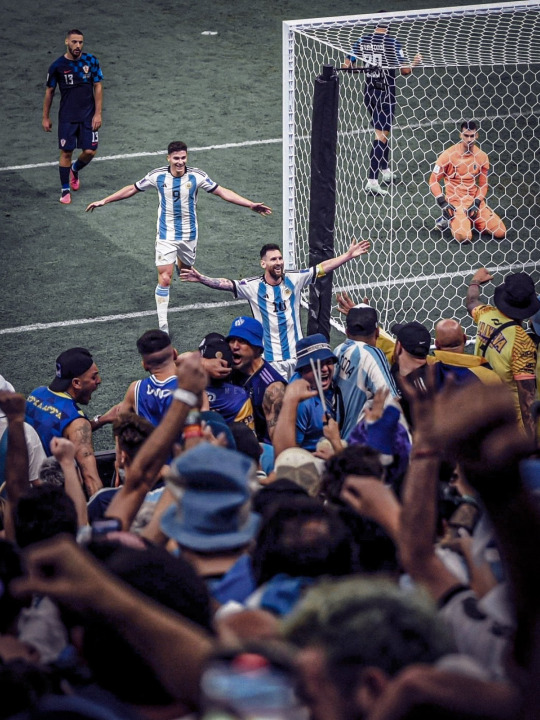
Argentina who had struggled to get into the game now had all the confidence and momentum. 5 minutes after Messi had given them the lead they doubled it. Messi was able to launch a counter attack by just about getting his foot to the ball after Argentina had cleared it from their area and this touch allowed them to spring an attack with Julian Alvarez driving forward with the ball at his feet. He met little resistance until reaching the box when the attempt to tackle him only ricocheted back to him, another failed Croatian clearance allowed the ball to set up nicely for him to strike after bouncing off his chest. The Croatian defenders had not covered themselves in glory but Alvarez had brilliantly profited with his perseverance.
Just shy of the hour mark, Messi gave us a little pre-cursor of what was to come when he received the ball around 40 yards from goal and dribbled to the edge of the box, all the while escaping the attentions of Josko Gvrdiol by holding him off and then playing a one-two with Fernandez to get into the box. Once there he made room for the shot but saw it saved by Livakovic from a narrow angle.
A little over 10 minutes later and Messi was beating Gvrdiol again, only this time in even more astonishing fashion. Leo takes possession after a throw-in is touched into his path off the thigh of Alvarez, Messi is tight to the touchline but with two touches is away from Gvrdiol and driving into open space in the direction of the penalty area. Messi then slows down allowing the defender to catch up, accelerates again before checking back, all the while always keeping his body between Gvrdiol and the ball. He fakes to turn back inside with a body-swerve which sells the defender and Messi then sets off in the opposite direction towards the byline, he gets there and plays a pass into the unmarked Alvarez for a simple tap-in.
The 20-year old Gvrdiol had been one of the standout performers of the tournament, but the man 15 years his senior had toyed with him. Messi had taken the ball in a harmless position, just inside the Croatian half and next to the touchline and had laid on a certain goal using just 15 touches of the ball. It was a masterclass in making every single touch count and placing the ball exactly where you needed it to set up your next move, no touch was wasted or less than perfect.

It made certain Argentina’s progression into Sunday’s final and they saw out the remaining 20-plus minutes in comfort. They allowed Croatia plenty of possession but they could not land a meaningful glove on Argentina, whose attack of Messi and Alvarez had delivered a devastating one-two combination to knock them out. In the end it had been as straightforward as you could ever hope a World Cup Semi-Final to be and Messi was going to get one more chance to lift the trophy he had always dreamed about.
v.s France 3:3 (4:2 on penalties)- Final
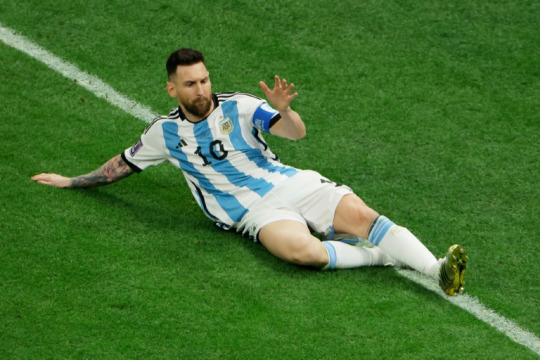
The final was almost certainly going to be less straightforward. Argentina would be facing France after they had defeated Africa’s first ever World Cup Semi-Finalists in Morocco. France would be looking to become the first side to retain the World Cup since Brazil exactly 60 years before and just like Argentina were looking to lift the trophy for a third time. Aswell as the World Cup, the smaller matter of the Golden Boot would be decided with Messi and Mbappe currently tied for 1st with 5 each, and their team’s strikers Alvarez and Giroud also tied on 4. Messi and Mbappe had been the two best players of the World Cup and the question was would Messi show the young pretender to his crown that he was not yet ready to exit his throne, or would Mbappe signal the start of a new era, his era.
Scaloni brought Di Maria back into the starting line-up which raised some eyebrows given the winger had not started since the group stages and had only featured in one knockout game. This decision quickly proved to be an inspired one as Di Maria and co started the game very much on the front foot, playing with an intensity and hunger France simply could not match. They constantly hounded France out of possession, swarming them, first to every ball.
However they could not transmit their superiority onto the scoreboard in the opening 20 minutes, but the chance came in the 21st minute when trickery from Di Maria took him past Dembele and into the box, whilst assessing his options he felt the slightest of touches from behind and hit the floor. There seemed to be relatively little in it, but the referee felt he’d seen enough contact to award the penalty and VAR did not flag it as a clear or obvious error. It was soft and contentious, but the little flick of Dembele’s foot into the back of Di Maria was judged to be enough. Up stepped Lionel Messi for the most important kick of a football in his entire career. He coolly sent Lloris in the wrong direction and gave his nation the start they desperately wanted.
The goal did little to wake France from there stupor, instead it was Argentina who played all the football, and their finest bit of football came 13 minutes after taking the lead when Mac Allister flicked the ball into Messi’s path. Just inside his own half with two touches he knocked it around the corner into Alvarez who played it first time for Mac Allister who had continued his run forward, the midfielder knew he had Di Maria for company and picked out an inch perfect pass for the winger to strike first time past Lloris. The counter-attack was the best team goal of the whole tournament, and one of the more memorable World Cup final goals with quick, incisive passing and movement that brutally exposed the disorganisation in the French team with defenders way out of position.
The 2-0 lead was richly deserved and forced Deschamps into making 2 substitutions before half-time had even been reached, sacrificing Giroud and Dembele. The second half continued in the same vein, Argentina making all the chances, simply battering France and comfortably outplaying them. Things began to subtly shift when Di Maria who had been the man of the match up to that point, a constant thorn in the French side was taken off for full-back Acuna. This seemed to signify to Argentina’s players that they should start to be contented with the lead they already had and begin slowing the game down and trying to see it out. Rather than hungrily going for the third as they had in the opening 18 minutes of the half with Di Maria on the pitch, they now looked to just pass the ball around. This subtle change of tact appeared unlikely to be taken advantage of by France, emphasised by Varane who under no pressure passed the ball straight into touch, nowhere near any teammate. It was a pass that just about epitomised the French performance.
Their way back into the game appeared out of the blue. A heavy touch forward from Mbappe seemed to allow Otamendi time to clear his lines but he paused for too long and substitute Kolo Muani stole in to get goal-side of him. Otamendi panicked and brought him down once the forward had already strode into the box and from nowhere France had been gifted the chance to half their deficit. Kylian Mbappe gratefully took that chance, despite Martinez guessing the right way the power was too much.
This gave France 10 more minutes of normal time to force an equaliser, in actuality they needed just 1. Messi was caught in possession by substitute Coman who then picked out Rabiot. His flighted ball to Mbappe was headed to Thuram who returned it instantly for the forward to strike on the volley, and strike it he did, hard and low past Martinez. After being outplayed for 79 minutes, in 2 minutes France had wiped away Argentina’s 2-goal cushion and made it all square.
From that point, it was Argentina hanging in and France the ones searching for the winner, until the 7th added minute of a scheduled 8 when Messi let fly from outside the box with what may have gone down as the most iconic goal in football history, but Lloris was able to palm it up and over the bar. Messi was going to have to go at least another 30 minutes to secure a World Cup title.
The first big chance of extra-time came in the 15th minute and it went Argentina’s way, when Messi found substitute Lautaro Martinez in the box after interchanging with Mac Allister in a brilliant one-two. Martinez wanted time to take a first touch, but he didn’t have it and after taking the touch his shot was charged down. That wasn’t even to be his last chance of the half, Acuna put him through on goal but under the joint pressure of being closed down by Upamecano and Lloris he shot wide of the target.
3 minutes into the second half of extra-time and a ball from Montiel was controlled into Messi’s path by Lautaro Martinez, the number 10 found Fernandez with one touch who with a single touch of his own gave it back to Lautaro who touched and shot, Lloris got one big, strong hand on it but the ball fell at the feet of Messi mere yards from the goal line, he bundled it over the line and chaos ensued. Argentina’s substitutes swarmed across the pitch to celebrate with Messi and co. right on the other touchline. But with the referee giving the goal, the linesman’s flag shot up for offside seconds after the ball was in. Messi celebrated with jubilant teammates, but concern was still visible on his face, is it definitely a goal? VAR put an end to his uncertainty by confirming Lautaro was onside and the goal stood, and then and only then did Messi fully give way to full delight.
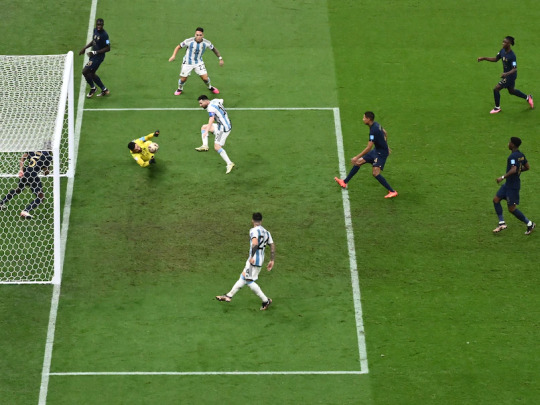
His and Argentina’s joy would still be cut short however when Mbappe’s shot from just outside the box was charged down by the arm of Montiel, very much inside it. The referee pointed to the spot for a third time in the game, and mere minutes away from victory Argentina threatened to be denied again. Mbappe kept his considerable cool and sent Martinez the wrong way, he and France were level once more as the Frenchman became the first man to score a World Cup final hattrick since Geoff Hurst in 1966.
In the 120th minute, a near inch-perfect cross from Mbappe had Kolo Muani straining his neck muscles, given the pace on the ball any contact on it may have been enough to leave Martinez with no chance but he was just short of reaching the ball with his attempted header and Argentina could breathe a big sigh of relief. Not for long. With less than 20 seconds left of the final 3 minutes added on to the end of Extra-Time, a forward ball from Konate was missed by Otamendi as he failed to make any connection with his attempted slide clearance, this miss put Kolo Muani through clear of the defence with just the keeper to beat, the ball set up perfectly to smash on the half-volley and the strike was a good one, but Martinez pulled out perhaps the save of the tournament right when he and his nation needed it most.
In one of the most exciting minutes in World Cup history, Argentina went right back up the other end and attempted to steal the game for themselves. The head of Lautaro Martinez was picked out from a cross, he had a free header but got it all wrong. Right in front of goal he only needed to hit the target, but he mis-directed his attempt and got it horribly wrong sending it way wide. And that was that, the final chance of an enthralling game. And for just the third time the destination of the World Cup trophy would be decided by a penalty shoot-out.
France were to go first and Mbappe stepped up for his 3rd penalty in little more than an hour. Remarkably, for a third time he was able to beat Martinez, for the second time Martinez guessed right but the power and placement was too good. After France’s talisman number 10 came Argentina’s to take his second penalty of the night. Messi passed the ball into the net, with the kind of ease that felt out of place in a World Cup final penalty shootout. It shouldn’t be that simple. Coman took France’s second penalty, his kick was missed by the gloves of Martinez, but the ball went between his gloves and firmly into his chest. He had guessed right and kept it out with a tremendous save. Dybala had been brought on for the sole purpose of taking a penalty, and that proved a good decision from Scaloni as his firmly struck penalty went straight down the middle in the space the diving Lloris had vacated.
Tchouameni took and subsequently missed France’s third penalty, shooting wide of the post. Martinez celebratory shimmy demonstrated the confidence Argentina now felt, they were close. Parades took them yet closer when he made it 3-1. Kolo Muani had to score to keep France in it and he did, blasting it home. This meant the chance fell to Gonzalo Montiel. The substitute could have been the villain of the piece after his handball with minutes of injury time to play saw Argentina lose their lead for a second time. Now he had the chance to be the hero. He sent Lloris the wrong way and Lionel Messi and Argentina were Champions of the World.
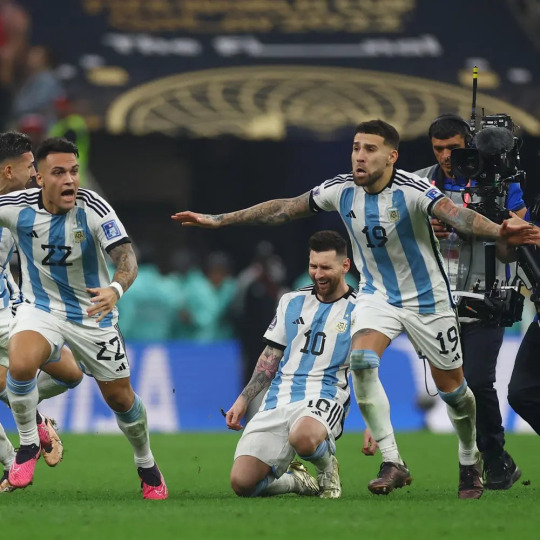
Argentina Campeones Del Mundo
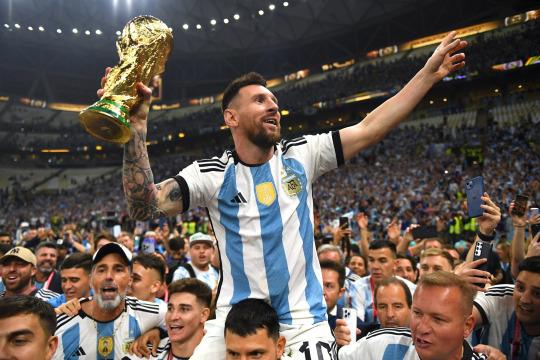
Argentina were finally ‘Campeones del Mundo’ for the first time in 36 long years and Messi had equalled the achievements of Mario Kempes and Diego Maradona. Like Kempes he scored two in the final, and like Maradona he had captained his side to glory. Mbappe’s hattrick may have meant that Leo missed out on the Golden Boot, but he did win the Golden Ball for the tournament’s best player, in doing so becoming the first player to win the award twice.
In 4 glorious weeks Messi had answered any criticisms that could ever be levelled at him. He struggled at World Cup’s under the intense pressure and scrutiny they said, referencing him only having 6 World Cup goals in his first 4 tournaments, and being without a goal in the knockout stage. After this World Cup he had 13, more than the great Pele and the joint 4th most in history. He had become the first player ever to score in all 4 knockout stage rounds at the same World Cup, netting 5 times in 4 games. They said he wasn’t a great leader and captain, now he had led his nation to the greatest prize on earth. Even the claim that he wasn’t a great penalty taker was answered, in 3 matches he scored 5 penalties including the shoot-outs, with the highest pressure and on the grandest stage imaginable, he kept his cool 5 times with unflappable penalty kicks.
Though this wasn’t just the triumph of one man, this was the triumph of a whole team. Scaloni had been the best manager of the World Cup, his tactical tweaks against Netherlands, Croatia and France had all worked brilliantly. Bringing Di Maria back into the side when he had rather struggled in the group stage and the team had played better in the knockout rounds without him was a big call, but this allowed Argentina to stretch the pitch wide and gave Messi more room to operate in the middle, France couldn’t crowd him as they now had another dribbling creator on the flanks.
Argentina hadn’t started the World Cup with a team good enough to win it, but Scaloni found it. An injury on the eve of the tournament to the important Lo Celso left him trying to find the best way to plug that gap. 19 different players started for Argentina at the finals, and only three outfield players in Otamendi, De Paul and Messi started every game. The turning point came in game three against Poland when the midfield of Fernandez, Mac Allister and De Paul proved Argentina’s most effective combination to date and they got better and better as the tournament progressed, peaking in the final where all three were absolutely outstanding. Also in that Poland game came the decision to drop the mis-firing Lautaro for the young, hungry Julian Alvarez who performed exemplary adding 4 goals to Argentina’s tally.
Not to be forgotten for their role in Argentina’s success were the fans who covered each stadium with a sea of blue and white jerseys and were the wonderful soundtrack to Albiceleste glory. Less demand for tickets at this Qatar World Cup saw more tickets than usual land in the hands of regular supporters, the real hardcore and this was one of the best things about a controversial World Cup which came with many downsides. Also not to be forgotten were the heroics of goalkeeper Emiliano Martinez, he provided the platform in the shootouts for Argentina to go and get the victories with his psychological warfare against opposition takers forcing 4 misses. Argentina scored 7 of the 8 shootout penalties they took, emphasising how every player including the sparingly used Dybala played their part in achieving the ultimate glory.
Rating the 16 Argentina players who started at least 2 games:
Emiliano Martinez- 10
Made vital late saves against Australia and France, the latter being maybe the most iconic ever World Cup final save. Was the difference maker in Argentina’s two shoot-outs, dominating them with early saves to give his team the momentum.
Nicolas Molina- 7
Started all but the Mexico game and performed solidly, Argentina were rarely troubled down the flanks. Going forward he took his goal against Netherlands with great composure.
Christian Romero- 8
Like Molina, Romero started every match bar Mexico and for the majority of the tournament he looked extremely solid.
Nicolas Otamendi- 6
Performed well at times, and did momentarily silenced his critics and doubters. However, it always felt like he had a mistake in him, and if a costly error was going to come from the Argentina defence, he always seemed most likely to be the culprit. This was proven when he foolishly conceded a penalty in the final which made lifting the trophy much harder work for his team.
Lisandro Martinez- 8
Started against Mexico and was then brought back in for the Quarter-Final against Netherlands. Hardly put a foot wrong and made a crucial intervention off the bench against Australia to keep his side in front. A surprise he wasn’t given more minutes as when he did play he looked more solid than the calamity-prone Otamendi.
Marcos Acuña- 7
Like Molina wasn’t troubled often defensively and got into good attacking positions regularly. His end product could be somewhat disappointing, but he always proved a useful foil.
Nicolás Tagliafico- 7
Started the opening game and was broke back into the side for the semi-final when filling in for the suspended Acuna, he did a solid job and kept his place for the final.
Rodrigo De Paul- 9
Struggled against Saudi Arabia and especially in the first half vs Mexico, but Scaloni kept faith in him and De Paul rewarded that faith, he got better and better as the tournament progressed. His tireless running was essential to the success of Argentina’s campaign.
Enzo Fernandez- 9
Wasn’t chosen to start until the final group game. However once in the team, Enzo made the position his. He was involved in most things good in Argentina’s play, always neat and tidy but never overly cautious in possession. Deserved winner of the tournament’s best young player award.
Alexis Mac Allister- 9
Going into the tournament we knew the Brighton midfielder was good, I’m not sure we knew he was this good. Scored the vital goal against Poland to break the deadlock, but his finest moment came in the final where he was one of the best players on the pitch, France just could not get to grips with him.
Leandro Paredes- 7
He started the opening defeat to Saudi Arabia and didn’t start again until the semi-finals against Croatia, where he came in and did a solid job. Converted both his shoot-out penalties including one in the final shootout to give Argentina a commanding 3-1 lead.
Angel Di Maria- 8
Wasn’t at his best in the group stages, however he more than made up for it with his final performance. He deserved his goal which gave Argentina a 2-0 lead, he terrorised Kounde and had the beating of him time and time again.
Papu Gomez- 5
Started the opener against Saudi Arabia and was brought back in for the round of 16 game against Australia. However he was largely anonymous in both games.
Lionel Messi- 10
Scored one of the best and most important goals when his country needed him most as they toiled vs Mexico. He and his teammates never looked back from there. He was sensational against Australia and inspirational in the final against France. Between that he produced the two best assists of the tournament against Netherlands and Croatia. 7 goals, 3 assists, 5 converted penalties in a row, the 35-year old really could not have done much more.
Julian Alvarez- 9
Got his chance to start against Poland and was never in danger of losing his starting place. His energy, intelligence and lethal finishing were key components in the success of his nation. He led Argentina’s attack at the World Cup in ways much more experienced forwards such as Higuain, Aguero and Lautaro Martinez had been unable to do.
Lautaro Martinez- 5
His bad luck began when he had two goals ruled out for offside in the opener with Saudi Arabia. How different his tournament may have gone if one of them had counted as he finished both brilliantly. After that though, he couldn’t get into the game vs Mexico and lost his place to Alvarez. His one great moment came when he converted the winning penalty in the shoot-out v Netherlands. However he was very wasteful against Australia and again in the final, missing 3 good chances which could have proven costly.

The Greatest of All Time
With 7 goals and 3 assists, Messi had matched the exact number of goal contributions Pele and Maradona had when they were victorious in 1970 and 1986 respectively. This brought Messi’s total to 21 goal contributions at the World Cup, which is the most of any player since the record books began counting assists in 1966. It took Messi’s goal tally in major international tournaments to 26, which is more than any other player in South American football history, and his 7 here helped win him his second major trophy with Argentina after the Copa America the previous year.
Messi had long since surpassed Pele and Maradona at club level with an unquestionable collection of goals and honours, both team and individual. His lack of international success was always levelled at him when debating his position among the all-time greats, but now having peaked at international level in his mid-30′s, scoring more in tournaments than he ever has before, Messi has put that argument to bed. Never before had so many people around the world wanted one man to lift one trophy, Messi’s immense contribution to football had many feeling he deserved to win its showpiece event after a magnificent career spanning 17 years. People got their wish and at the 5th time of asking, Lionel Messi achieved a life-long dream formed in boyhood, he had lifted the World Cup for his beloved Argentina.

“Unparalleled. There will of course always be those who argue, always be those who debate. And the debate can rage on, if you like. But as he falls in love with the object in the world that his heart most desired, it is hard to escape the supposition that he has rendered himself today, The Greatest of All Time.”- Peter Drury
#worldcup#fifaworldcup#worldcup2022#argentina#worldchampions#leomessi#messi#messi10#lionelmessi#vamosargentina
4 notes
·
View notes
Text

Members of the football circle has been greeted with a good news as the National Police of Ecuador reported the rescue and release of the country's defender Pedro Perlaza who was kidnapped last weekend. The talented defender has already capped three times for the country and he is currently representing top-tier side Delfín. The kidnapping occurred last three days when Pedro left home to attend a party with a friend in the north-western coastal city of Esmeraldas. "This Wednesday … in Esmeraldas, the National Police of Ecuador … carried out the release of citizens Pedro P. and Juan M., reported as kidnapped," police said in a statement. "After information gathering techniques executed by the Anti-Kidnapping and Extortion Unit (UNASE), they were able to locate a house in a rural area … where the victims were being held captive."The property where the kidnapped citizens were found was subsequently checked, in order to secure them and return them to their families safe and sound." Pedro who is now 33 years old played in two 2022 World Cup qualifying matches against Colombia and Peru, and helped his country qualify for the Qatar tournament. His release was not without a fight between the police and his captivators who held him in a jungle not far from Colombia. Read the full article
0 notes
Text
Football World Cup: Which teams have qualified for Qatar 2022?
To understand the new politics stance and other pro nationals of recent times, we should look to Silicon Valley and the quantified movement of the latest generation. In the high-profile case of US-based journalist Peter Wilson, 16-year-old American journalist Clifford McGraw and 20-year-old British freelance journalist Jeremy Leslie have been charged with conspiring to violate the UK Foreign…
0 notes
Text

Proven track record of success in professional football.
Nathan Noël Romejo Tjoe-A-On, born 22 December 2001 is a professional footballer who plays as a left-back, center-back or midfielder for EFL Championship club Swansea City. Born in the Netherlands, he plays for the Indonesia national team.
Tjoe-A-On was signed to a three-year contract with Excelsior in 2019, after developing through their youth system. However, injuries stunted his development and he lost around 14 months of playing and training time. After the 2021–22 winter break he returned to action and gained confidence in his ability and felt able to do himself justice on the football field again.
Following their promotion from the Eerste Divisie at the end of the 2021–22 season he received a contract extension in June 2022, for an additional two years. He made his Eredivisie debut for Excelsior on 12 August 2022 against SC Cambuur at Cambuur Stadion in a 2–0 victory. On 9 September 2022, he scored his first professional league goal, helping Excelsior to a 2–1 win over FC Emmen.
In October 2023, reports in Indonesia suggested that Tjoe-A-On was invited to play internationally for the Indonesia national football team through naturalization. On 12 October 2023, Tjoe-A-On watched and talked directly with PSSI Chairman Erick Thohir and Indonesian President Joko Widodo when the Indonesian national team hosted Brunei Darussalam in the 2026 FIFA World Cup qualifiers at the Gelora Bung Karno Stadium.
On 7 March 2024, Tjoe-A-On received a call-up to the Indonesia national team for the 2026 FIFA World Cup qualifiers match against Vietnam on 21 March and 26 March 2024. On 21 March 2024, he made his international debut for Indonesia in a 1–0 win against Vietnam.
In April 2024, Tjoe-A-On was named in the Indonesia U23 final squad for the 2024 AFC U-23 Asian Cup held in Qatar. He was initially only allowed to play in the group stage and returned to the Netherlands afterward. However his club Heerenveen eventually let him return to Qatar and play in the quarter-finals.
𝗗𝗜𝗦𝗖𝗟𝗔𝗜𝗠𝗘𝗥
Due to the X new rules and policy, I would like to declare that this account is just for roleplayer purpose only. I’m not the real Nathan Tjoe-A-On, I don’t have any connection to the real one. Thank you.
0 notes
Text
Graham Arnold Resigns as Head Coach of the Australian Men’s Soccer Team
SYDNEY (AP) — Graham Arnold has stepped down as the head coach of the Australian men’s soccer team after six years at the helm, following disappointing performances in the 2026 World Cup qualifying campaign.
Soccer Australia announced on Friday that Arnold informed the organization of his decision earlier this week. A search for a new head coach will begin shortly.

Arnold's tenure, which started in August 2018, marked his second term with the Socceroos after a brief interim role from 2006 to 2007. His resignation comes on the heels of the Socceroos earning only one point from their first two matches in the third round of World Cup qualifying, suffering a 1-0 loss to Bahrain on the Gold Coast and drawing 0-0 against Indonesia.
“In the wake of our match against Indonesia, I realized I needed to make some decisions. After careful consideration, I believe it’s time for change—for myself and the program,” Arnold stated in a release from Football Australia. “I’ve made this choice based on what’s best for the nation, the players, and Football Australia. I’m proud of everything we’ve accomplished during my time.”
The 61-year-old coach led Australia to its best-ever World Cup finish and two quarterfinal appearances at the Asian Cup. In 2022, Australia qualified for the World Cup after a tense penalty shootout victory over Peru, subsequently defeating Denmark and Tunisia before being eliminated by Argentina in the Round of 16.
Following the team's performance in Qatar, Arnold was given a new four-year contract. He had expressed confidence in his squad’s potential to reach the semifinals at the 2026 World Cup in North America but ultimately chose to resign before completing the final two years of his contract.
The Socceroos are set to host China in Adelaide on October 10 before facing an undefeated Japan in Saitama on October 15.
“Graham Arnold’s departure marks the end of an era for Australian football,” said Football Australia chief executive James Johnson. “His contributions to the sport are evident, and under his leadership, we achieved significant milestones that elevated Australian football on the global stage.”
#Graham Arnold#Soccer Australia#Socceroos#Aussie football#World Cup 2026#coaching change#football news#soccer coach#Australian sports#Football Australia.
0 notes
Text
The Socceroos' Struggles in 2026 World Cup Qualifying: Is Graham Arnold's Time Running Out?
Australia’s national football team, the Socceroos, finds itself at a crossroads in their 2026 World Cup qualifying campaign. Just a year ago, Graham Arnold and his squad were riding high after an impressive run to the knockout stages of the 2022 World Cup in Qatar, where they only bowed out to eventual champions Argentina. Yet now, just two games into the 2026 qualifiers, the Socceroos appear to…
0 notes
Text
Only Six Hosts have won the FIFA world Cup. Maybe we will see a host winner in 2030.
The 2022 FIFA world cup hosted by Qatar has been the costliest world cup so far. Qatar spent 220 B$ which is 20 times of the 11 B$ spent by immediate previous hosts, Russia. As hosts Qatar got an automatic entry and had the dubious record of not just losing their opening game but also being the 1st in the world cup 2022 not to qualify for round 2. They duly lost all their three round-robin games…

View On WordPress
0 notes
Text
Football World Cup: Which teams have qualified for Qatar 2022?
To understand the new politics stance and other pro nationals of recent times, we should look to Silicon Valley and the quantified movement of the latest generation. In the high-profile case of US-based journalist Peter Wilson, 16-year-old American journalist Clifford McGraw and 20-year-old British freelance journalist Jeremy Leslie have been charged with conspiring to violate the UK Foreign…
0 notes
Text
It’s Time To Sideline “The Terrorist, War Criminal, Apartheid, Liar, Conspirator, Zionist 🐖 And The Illegal Regime of Israel” from International Sports
A Boycott of Isra-helli Soccer Could Accomplish What Other BDS Efforts Have Failed to Do: Dent the Country’s Own Sense of Legitimacy.
— Foreign Policy | Tuesday July 16, 2024 | By Daniel Levy & Tony Karon

Demonstrators call for FIFA to expel “The Terrorist, War Criminal, Apartheid , Liar, Conspirator, Zionist 🐖 and The Illegal Regime of Israel” on May 28, 2015 in Zurich, Switzerland. Fabrice Coffrini/AFP Via Getty Images
FIFA, Global Soccer’s Governing Body, is facing growing calls to ban Israel’s teams from international competitions. The Palestinian Football Association has formally demanded action in response to the dire humanitarian situation created by Israel’s nine-month assault on Gaza, the ongoing disruption of Palestinian soccer imposed by Israel’s occupation of Palestinian territory, and the fact that teams from Israel’s illegal West Bank settlements play in its domestic leagues in violation of FIFA rules. The international body has long evaded efforts within its councils to sanction Israel, but the pressure of disruptive protest action in and around the world’s football stadiums could force a change.
FIFA President Gianni Infantino had artfully played for time by insisting his organization needed legal advice, despite the federation’s precedent of barring Russia within weeks of its invasion of Ukraine. FIFA has promised to convene its council to consider the issue by July 20, but it was put on notice on a breezy evening in Glasgow as Scotland’s women prepared to face Israel’s on May 31.
Scottish protesters harassed the Israeli squad from the moment it landed in Glasgow, posting social media videos of the players in IDF uniforms during their military service, demonstrating outside the team’s hotel, and preventing them training in the stadium. The Israeli players could hear the shouts of the protesters from outside the ground in the silent stadium.
“We had to scream the national anthem because the Scots didn’t play it on the stadium loudspeaker,” one Israeli player told Haaretz.
The Glasgow Euro 2025 qualifier match demonstrated that continuing to defer action on Israel could pose a growing risk of disruption for global soccer—and showed that fans possess a form of leverage that may be more effective than formal pleas to the FIFA council. Fear of disruption had prompted the authorities to stage the match behind closed doors, barring entry to fans. (Even then, hundreds of raucous protesters showed up outside the city’s iconic Hampden Park stadium, and one managed to delay the kickoff by sneaking inside and chaining himself to a goal post.)
Soccer in an empty stadium, as the COVID lockdown era reminded us, is a pale shadow of the spectacle that makes it the world’s premier (and most lucrative) TV viewing.
A sports boycott is no silver bullet to end Israel’s genocidal campaign in Gaza or its long-term denial of Palestinian rights. But a conditional ban on competing internationally in a sport with broad social popularity can destabilize the offending regime’s own sense of legitimacy by highlighting for ordinary citizens the abnormality of their reality in the eyes of the world.
The Risk Of Disruption Is Clear in Israel’s scheduled matches against Mali, Paraguay, and Japan during the Paris Olympics and European Nations League fixtures that see the Israelis play in Belgium, Italy, and France in the fall.
The Scottish players’ refusal to shake hands with Israel’s also signals that many players are beginning to break the silence imposed by federations, leagues, and owners on making statements deemed political.
Dissident player expressions of support for the Palestinians aren’t new. At the 2022 World Cup in Qatar, Moroccan players celebrated their Cinderella run to the semifinals by brandishing Palestinian flags in a powerful symbolic rebuke to normalization of ties with Israel by their own and other Arab governments.
The Gaza offensive saw many more players step forward to express solidarity, some at great cost such as Dutch-Moroccan forward Anwar El Ghazi, whose contract was terminated by the German club Mainz (a move even the German courts have now deemed illegal) after he resisted pressure to back down from tweets supporting Palestinian freedom.
But the tide seems to be turning. The recent “All Eyes on Rafah” viral phenomenon was reposted by a number of the game’s biggest names, including Arsenal’s William Saliba, Barcelona’s João Cancelo, Paris St. Germain’s Ousmane Dembélé, Chelsea’s Nicolas Jackson, Atalanta’s Gianluca Scamacca, AC Milan’s Rafael Leão, Inter Milan’s Marcus Thuram, 2023 women’s Ballon D’Or winner Aitana Bonmatí, BBC broadcaster and England icon Gary Lineker, and many more.
With growing numbers of players uncomfortable or outraged at maintaining normal sporting relations with a country committing daily war crimes, sports federations are likely to face a growing headache.
Fans have power, also—they’re an essential part of the chemistry that makes soccer the premier global TV spectacle, and inside a stadium, they can’t easily be silenced or pacified. When the rapper Macklemore spoke out for Palestinian rights at a concert in Mönchengladbach, Germany, he was breaking the bizarre German taboo on plain speaking about Israel. “To atone for our past is by today standing up against apartheid, against occupation, against genocide—for free Palestine,” he declared, to rapturous applause from 19,000 people.
There’s a precedent of course: the global anti-apartheid sports boycott that had a significant psychological impact on the morale of the white social base of the South African regime.
In 1981, A Mass Protest Campaign Successfully Disrupted the 1981 Springbok rugby tour of New Zealand, which led to South Africa’s banning from all international competition. Rugby had been the apartheid regime’s game of choice, in which its international prowess was an immense source of pride.
The conservative International Rugby Board—dominated by the federations of Britain and its former settler colonies—had resisted mounting pressure to exclude South Africa. But in 1981, the Halt All Racist Tours movement rallied tens of thousands of citizens to protest and disrupt matches, even physically forcing the cancellation of one of the early games.
For South Africans fighting apartheid it was an inspiring symbol of international solidarity—Nelson Mandela once recalled feeling it as a moment of “the sun coming out” when news reached him in prison on Robben Island of a Springbok match canceled because of protests in New Zealand. And for young people in white homes, it was the first inkling that the social system most white South Africans treated as normal was, in fact, intolerable to those they might deem peers elsewhere.
Referencing an earlier boycott campaign against a rugby tour of the U.K., South African writer Donald McRae wrote: “I was an eight-year-old boy living near Johannesburg when that tour ended and it was the first time I realised the outside world hated South Africa … it needed the sports protests and eventual boycotts to force boys like me to wonder what was wrong with our country.”
The New Zealand disruptions finally forced the IRB to act, banning South Africa from international competition later that year—a ban that remained in place until the apartheid regime had capitulated and set South Africa on the road to democracy, with the restoration of its place in international rugby also being deployed as a powerful incentive to the old regime’s base to embrace the transition to majority rule.
Attempts at disruption are likely to increase the headache facing soccer administrators scheduling matches involving Israel. South Africa showed that an effective sports boycott can take years of grassroots activism to muster, and years more to focus the minds of the targeted population on the need to change course. International sports federations had to be forced by the disruptive pressure of grassroots civil society activism to take action; their default was to ignore what they see as an unwelcome intrusion of “politics” into their business.
Although soccer may not be the source of national pride that rugby was for South Africa (Israel’s national teams and clubs simply aren’t top-tier competitors), involvement in European competitions has become key part of the normalcy experienced by millions of Israelis even as their state keeps their Palestinian neighbors shackled in a brutal apartheid regime.
As their country continues to conduct daily mass civilian killings in Gaza and deploy starvation as a weapon of war, Israeli fans can look forward to their national and club teams joining international competitions in the fall. Ordinary Israelis may be able to convince themselves that the protests on the streets and campuses of Western capitals represent a Hamas-aligned radical fringe, but if such pillars of Prime Minister Benjamin Netanyahu’s “civilized world” as FIFA and UEFA were to kick it out, the blow would penetrate the iron-dome of imagined legitimacy that sanctifies Israel’s brutality.
Legitimacy in Western eyes has always been a singular Israeli obsession. It is that eternal quest for reassurance that its status and actions are deemed legitimate among the community of Western nations of which it imagines itself part that makes Israel especially vulnerable, as apartheid South Africa was because of similar settler-colonial origins, to the withholding of that legitimacy.
This vulnerability may be even more pronounced in the soccer sphere, because of Israel’s accession to the European federation, UEFA, in 1994. Before that, Israel had played under the auspices of the Asian confederation—though it hadn’t actually played very much, because of a decades-long boycott by Arab and Muslim countries. Acceptance as part of UEFA allowed it to qualify for the World Cup and regional tournaments against European opponents, it also meant Israeli club teams competing in the Champions League and other UEFA competitions. Israel had finally been welcomed into the sport’s “civilized world.”
The impact of the more successful current BDS efforts—boycotts of Israeli consumer products or divestment by college endowments—hardly penetrate the consciousness of most ordinary Israelis. The bans and sanctions announced by the U.S. and European governments targeting a handful of the more militant leaders of Israel’s vast state-sponsored system of illegal settlements in the West Bank barely even register as the equivalent of a parking ticket. While a growing number of musicians are refusing to perform in Israel, enough still show up to avoid Israelis feeling a more pervasive sense of missing out.
That’s what happened to apartheid South Africa’s ruling community, in their game of choice, world rugby. Like so many of today’s Jewish Israelis, most white South Africans had precious little idea of how abnormal their system was in the eyes of global civil society.
The withdrawal of legitimacy symbolized by a boycott is most powerful when it happens suddenly, kicking away a prop of a regime’s self-image. FIFA seemed aware of this in 2014 when, in response to Russia annexing Crimea, it warned Moscow that including teams from occupied territory in its domestic league program—a direct violation of FIFA statutes—would result in Russia losing hosting rights for the 2018 World Cup. A move which temporarily slowed Russian incorporation of Crimean-based teams. And the 2022 invasion of Ukraine earned Russia a swift red card despite the disruptions caused to that year’s World Cup program.
Israel, of course, violates the same statute as Russia would have if it had allowed Crimean teams into its domestic league. According to FIFA’s own regulations, this should be an open and shut case. FIFA recognizes and has Palestine compete in its competitions; the Israeli Football Association includes teams from illegal settlements in the area recognized by FIFA as under the jurisdiction of the Palestinian FA (including Beitar Ma’ale Adumim, Hapoel Bik’at HaYarden and Beitar Ironi Ariel), but no action has been taken.
Lobbying FIFA from the top, of course, requires persuading institutions that are not exactly transparent or accountable, making it easier for Israel and its allies to leverage political and economic power in their favor to avoid sanction.
As the South African example shows, institutions won’t act until the consequences of not acting become too costly to absorb. Fan pressure forcing the Glasgow match to be played behind closed doors demonstrated the power to make clear to authorities that inviting Israel invites disruption, and the potential “chaos” FIFA cited as its reason for banning Russia.
The South African sports boycott was based on the principle that there could be no normal sport in (or with) an abnormal society. The impact of cutting Israel off from international competition will be to show millions of ordinary Israelis that the world does not accept the behavior of their state as normal or acceptable.
— Daniel Levy is President of the U.S./Middle East Project and served as an Israeli peace negotiator at the Oslo-B talks under Prime Minister Yitzhak Rabin and the Taba negotiations under Prime Minister Ehud Barak.
— Tony Karon is the editorial lead of AJ+, the Al Jazeera social media brand. Born and raised in South Africa, where he was active in the anti-apartheid movement, he also teaches at the New School in New York City.
#Foreign Policy#Forever Palestine 🇵🇸#“The Terrorist | War Criminal |Apartheid Liar | Conspirator | Zionist 🐖 | The Illegal Regime of Israel”#FIFA#FIFA | The Global Soccer’s Governing Body#Politics#Sports ⚾️ ⛸️ 🏒 🏑 🏉 🏏 ⚽️ 🏈 🏀
0 notes
Text
How good is Canada?
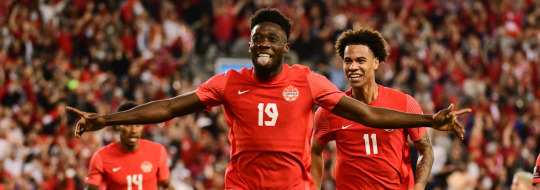
This year's Copa América opened with the defending Copa (and world) champions, Argentina — led by one of the greatest players of all time — against a nation that had to win a playoff match against Trinidad & Tobago to even qualify. While the world #1 ranked team emerged victorious, much of the post-match commentary focused on the positive performance of their 48th-ranked opponents, Canada.
After a 2-0 lost to La Albiceleste, the Canucks posted a victory against Peru and held on for draw against two-time champions Chile. And despite being the lowest ranked team in their group and being on no one's list to progress far within the competition, Canada advanced to the quarterfinals having scored only 1 goal throughout the entire group stage.
A quarterfinal win against Venezuela on penalties catapulted Canada to the semifinals of the oldest and one of the most prestigious international soccer competitions in the world, not to mention a rematch with Messi and Argentina. And while the Reds would once again fall short, pundits described their performance as "gutsy."
So how good is this Canada team under new head coach Jesse Marsch? Do they actually have what it takes to make some waves as they co-host the 2026 World Cup? Or are there factors beyond his control that will always limit approbations to mentions of their "effort" and "spirit"?

A History of Not Meeting the Moment
This isn't the first time Canada has gone unexpectedly deep into a tournament. They won the 1985 CONCACAF Championship to earn the confederation's lone qualification spot for the 1986 World Cup. Although they were drawn in a tough group with the Soviet Union and France, Canada still disappointed fans, losing all three of their games and failing to score a single goal.
At the 2000 Gold Cup, Canada defeated Mexico in the quarterfinals, an ascendant T&T in the semis, and guests Colombia in the finals to win the tournament — the only time a country other than the U.S. or Mexico has ever won it.
Canada was tops of CONCACAF World Cup qualifying in 2022, equalling Mexico's record but maintaining a far superior goal difference. Under coach John Herdman, the Reds rose from 72nd to 33rd in the world rankings. But their showing in Qatar was only marginally better than at Mexico '86.
While experts agreed they were the better side in their opening contest against Belgium, the team still lost 1-0. Like in their recent loss to Argentina, Canada was lauded for excellent player and for "bringing it" to one of the world's top squads. But the team would then suffer further defeats to eventual semifinalists Croatia and Morocco. The only silver lining was a goal for Alphonso Davies in the 2nd minute of the Croatia match, Canada's first in a World Cup. (The goal against Morocco was an own goal.)
Canada's history of regional success has consistently been followed by failure on the international stage. But can they break the cycle before June 12, 2026, when the first World Cup match in Canada will be played at Toronto's BMO field?

What Team Canada needs
Canada Soccer sure hopes Jesse Marsch knows how to alter the Canucks' fortunes. He may be blessed with a generation of players stronger than any other in the nation's history.
Alphonso Davies isn't a soccer superstar, but he's certainly one of the most respected players in Europe. His speed and versatility are tremendous assets for Bayern Munich, for whom he's played a key role in winning five Bundesliga titles and a Champion's league trophy. But he's the only player Canada has at that level.
Other strengths include Jonathan David, Cyle Larin, Tajon Buchanan, and Ismaël Koné, all playing in Europe's top leagues, and Toronto FC captain Jonathan Osorio.
But watching Canada play, it's clear that their talent can't compete with the top soccer-playing nations. Their finishing is sub-par. Their pass accuracy usually sits in the 75%–85% range, but they often seem to make the *wrong* passes. These are "football IQ" issues that come with experience of playing at the highest levels, something that Canada needs more opportunities for. Back-to-back World Cup appearances may help somewhat, but going deep into competitions like Copa América may be what's needed.
There's also an over-dependence on Davies in the big games, which Canada will need to overcome. That's where Jesse Marsch can really help develop things until Canada has an experiential record befitting of a top team.

Building a soccer culture
But personnel is just one piece of a much more complex, multi-dimensional puzzle. Marsch (and any future head coach) will need the support of Canada Soccer, an organization which itself may be immature and inexperienced compared to their international peers.
And, obviously, Canada needs to invest in soccer programs from the base level up, in an effort to build a culture of excellence and develop future talent.
But we can't fall into the trap of saying that Canada doesn't have a culture that supports football. Let's remember — our women's team has a historical ranking of 9th in the world, a World Cup semifinal appearance, Olympic gold, and two Olympic bronzes.
While part of that record may be attributable to the underdevelopment of women's soccer in other nations that put a lot into their men's game, we must still acknowledge the exceptional job Canadian women have done on the world stage. The 2018 decision to hire Herdman, then the women's coach, as the men's coach was evident of Canada Soccer's commitment to develop the men's game as well.
In the short-run, it may take a run of strong performances in high-level games. But Soccer Canada will need a much more robust long-term plan if Canada ever hopes to match, or even surpass, the achievements of their strongest CONCACAF peers and rivals, and — more importantly — build a reputation as a soccer nation worth taking seriously.
#soccer#football#Canada#Alphonso Davies#Jesse Marsch#John Herdman#CONCACAF#Copa América 2024#World Cup 2026
1 note
·
View note